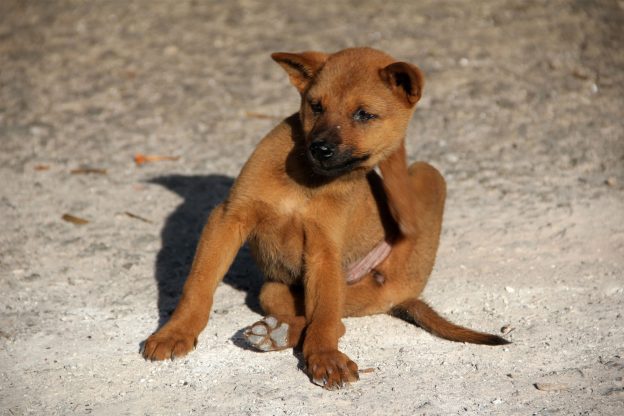
Dog skin conditions can cause itching and pain for our beloved pals. The DOGSLife Team investigates some of these problems, their treatment and how they can be prevented
Dogs can suffer from a range of skin conditions. They can be genetic, hormonal, infectious, allergic, parasitic or even cancerous.
Dr Ian Murdoch, veterinary surgeon at Pennant Hills Veterinary Hospital, discusses the main conditions and how they can be treated.
“Common signs of skin disease are inflammation with redness and itch, and self-trauma from scratching. There may also be crusts, scabs and/or bleeding on the skin. Some cases can also result in hair loss, lumps, oily and malodorous skin,” says Dr Murdoch.
What causes these skin conditions?
As there are a range of dog skin conditions, some which can appear in combination, the underlying cause can be varied.
- Genetic skin conditions can be caused by gene defects or inherited diseases from the pup’s parents
- Signs of a skin condition can show up from hormone imbalances
- Bacteria or fungal infections can occur because the skin is damaged in some way, for example from allergies or trauma, or getting skin wet as a result of swimming or humidity, or a poor immune system
- Allergic skin disease is due to the abnormal inflammatory response of the skin to otherwise benign substances like pollen or foods
- Parasites such as fleas can commonly affect the skin
- Cancers of the skin can be either spontaneous or caused by the sun (UV light), just like in humans
Are certain breeds more susceptible?
“Golden Retrievers tend to be prone to skin infections called hot spots. West Highland White Terriers are prone to allergic skin disease. White skinned dogs like some bull terriers or Dalmatians are prone to sun cancers just like fair skinned people,” says Dr Murdoch.
How can they be treated?
Treatments for skin conditions are as varied as the causes. “Many conditions are treatable,” says Dr Murdoch. “Infections can be treated with antibiotics, hormone imbalances can be corrected, parasites can be identified and killed, and cancers can be surgically cured.” It is important to note that not all skin cancers can be cured.
Some conditions, however, can only be managed, not cured. Allergies can be controlled with drugs to reduce inflammation, as can desensitisation injections, special baths, skin protection and avoidance and food supplements.
How can we prevent these?
Some conditions cannot be prevented, such as genetic or allergic conditions; however, others have quite effective prevention treatments.
“Regular parasite control is very good, especially flea treatment. A good diet can also help,” says Dr Murdoch. “Topical treatments applied can improve the skin barrier, and keeping the dog out of the sun and wearing special sunscreen or clothing is best to reduce risk of skin cancer caused by the sun. Make sure to get regular checks at the vet!”
Can skin conditions be seasonal?
Warm weather favours insects, so fleas and biting flies are much worse in the spring/summer/autumn. Also, spring can be worse for allergies with more pollen in the air. Humid weather can also lead to skin infections with bacteria or fungus. So make sure to protect your pet this season.
Make sure your furry friend is always looked after at our DOGSLife Directory



